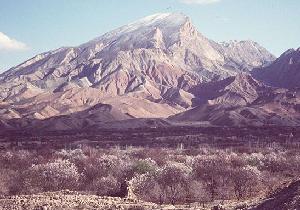|
|
|
Displaced and Desperate Years of drought and conflict have brought Afghanistan to a desperate situation, threatening the lives of more than half a million people, a top United Nations relief official said after a three day visit to the country last week. "A real tragedy is unfolding in front of us," Under-Secretary-General Kenzo Oshima, told reporters in Islamabad on his first mission as UN emergency relief coordinator. He warned that the situation in the country was going to deteriorate rapidly. Up to 600,000 Afghans have been newly displaced or have become refugees in 2000 and 2001 due to the twin problems of decades of conflict and two and a half years of drought. The number of those displaced continues to rise. Some find shelter in refugee camps in Pakistan, others simply move across the parched Afghani landscape. The South Asian drought has also parched Pakistan, Iran and India, but Afghanistan has been hit the hardest. Calling Afghanistan "one of the worst places in the world to try to live," Oshima said that although millions of Afghans have struggled to survive for many years, some of them could not manage any more. While drought is causing some of Afghanistan's problems, he blamed the ongoing conflict for the "massive human suffering" in the country. Both the ruling Taliban Islamic Movement and the opposition Northern Alliance have expressed full support for humanitarian activities inside Afghanistan and asked for increased assistance to the internally displaced and drought affected population throughout the country. On February 13 in the Afghan capital, Kabul, Oshima met with senior Taliban representatives including Minister of Repatriation Mawlawi Abdul Raqib, Deputy Foreign Minister Abdul Rehman Zahid, and Deputy Public Health Minister Mullah Sher Mohamed Abas Stanikzai. Ousted Afghan President Burhanuddin Rabbani told Oshima during a meeting in Faizabad, Badakhshan Province February 14 that if the international community does not urgently come to the aid of Afghans, a major humanitarian tragedy will unfold. Oshima warned that the world could not conduct "business as usual" with respect to Afghanistan, which requires exceptional actions from the international community, neighboring states and the parties to the conflict. Pointing out that recent fighting would only increase the number of displaced Afghans, Oshima told reporters, "I am especially concerned about those who have not been able to leave their homes and have had no access to international assistance." Usually, during the winter months of December to February, temperatures in Afghanistan can drop to freezing. Then come the rains, flash floods, and freak storms, followed by strong winds from May to August. But in 1999, there were no rains, floods, storms or snow, and many of Afghanistan's water reservoirs were not replenished. Since then, there has been precious little rain and the drought is causing many people to leave their homes in the hope that things will be better somewhere else. In Afghanistan's Faryab Province, 90 percent of the agricultural land watered by rain, so the effect of drought there is acute. The Pamir Reconstruction Bureau reports that the amount of water in canals is too little for irrigation, and the yield of irrigated land is much decreased. The water level in shallow wells has declined and dried up completely in some places. No water can be seen in the traditional reservoirs usually used for drinking water and for livestock. The grazing lands in the province are also largely dried. Livestock are left with no water and no food. Very few animals are left in the province. People are moving from the highlands to cities, towns, other provinces and neighboring countries. Pledging to raise awareness of the enormity of the tragedy confronting the population, Oshima said he would "work to impress on the parties their responsibility to take care of the Afghan people." The emergency relief coordinator also said he would ask donors for more short term emergency support for the newly displaced Afghans, as well as increased and faster contributions to the UN's appeal for relief funding to the country. Following a visit to the camps, UNICEF child protection officer Niloufar Pourzand called for special attention to the needs of the young. The Iranian Red Crescent has sent food, blankets and tents to neighbouring Afghanistan to assist thousands of displaced people, hit by a cold spell. During the past two weeks, over 40 tons of food, 500 blankets and 250 tents have been sent to the Afghan Red Crescent, which is distributing the relief supplies. The western region of Herat is home to some 30,000 displaced people, living in six camps. Many of these people still need shelter and other basic relief items, and 150 people died recently from the cold, according to a United Nations report. At this time of year, temperatures drop to minus 25 degrees Celsius (minus 13 degrees Fahrenheit). Some might blame the drought on global warming, but the Taliban told the Afghan people last July that they themselves are to blame for the severe drought affecting the country. Taliban leader, Mulla Mohammed Omar, said it was God's punishment for the people's discontent with Taleban rule, and neglect of their religious duties. According to the United Nations, over half a million Afghans have fled their homes since the beginning of last year because of the combined effects of war and drought. |

